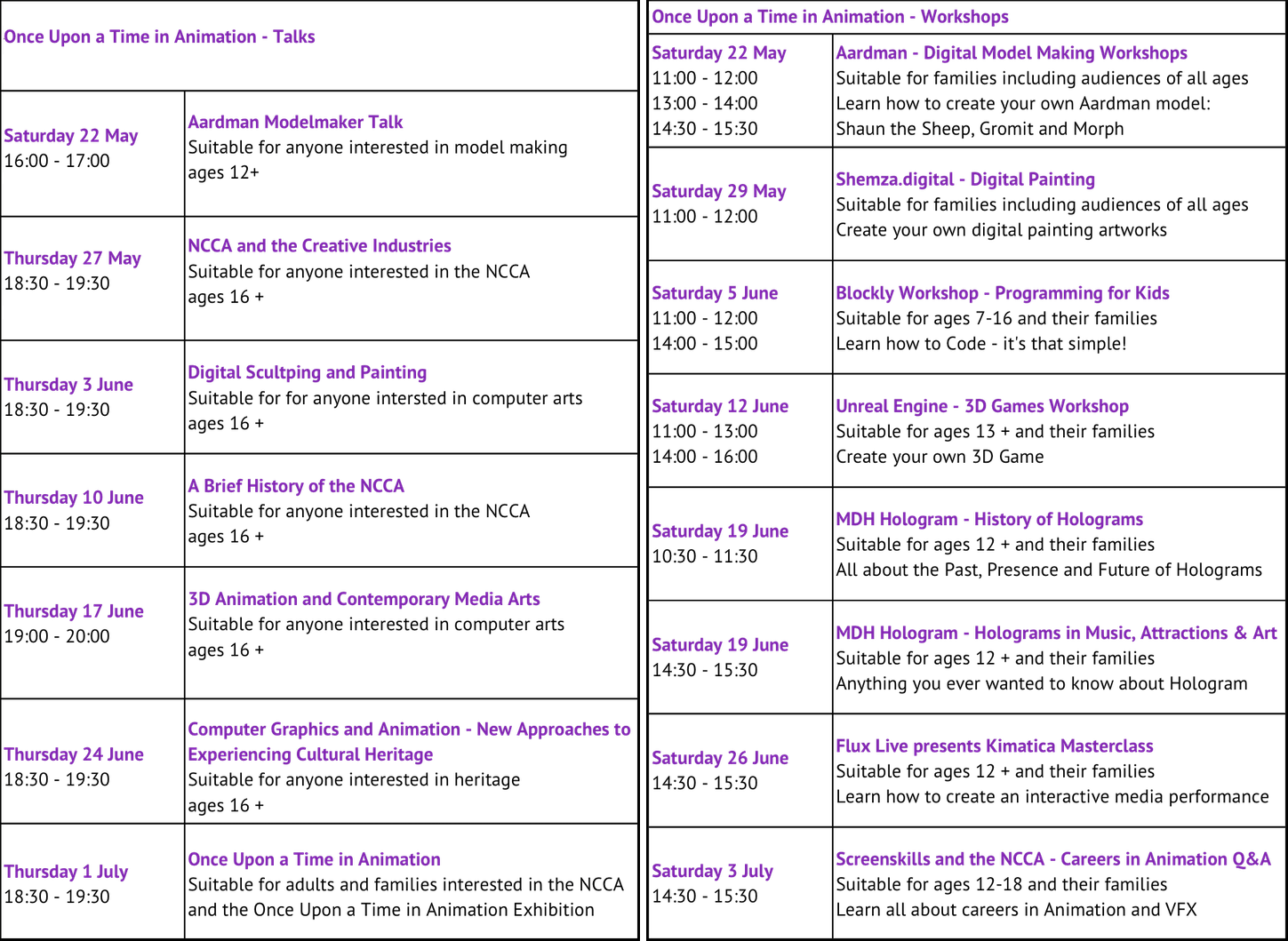Past
Events
The ‘Once Upon A Time in Animation’ exhibition at Poole Museum was framed by a rich programme of online workshops and talks, supported by The National Lottery Heritage Fund, which took place between May and July 2021.
Some of the talks can be accessed below or on the exhibition’s youtube channel.
Find out more___

A Brief History of the National Centre for Computer Animation
Founded by Peter Comninos and Peter Hardie at Bournemouth University in 1989 with the philosophy of marrying art and science to facilitate the production of Computer Animation, since its inception the National Centre for Computer Animation has been at the forefront of computer graphics and animation education and research.
In 1989______
The NCCA was the first institution that established dedicated degree programmes for computer animation
for which it pioneered a discipline-spanning approach of blending art and science education in a manner that three decades later is only rarely found elsewhere.
Driven by the motto of “Science in the service of the Arts”, the scientific and artistic work of NCCA students has been internationally recognised at high-ranking academic conferences and animation festivals and its graduates have contributed to countless award-winning films and animations.
In this talk we will examine the history of the NCCA and its truly interdisciplinary educational approach that has left the NCCA’s graduates highly sought after by the creative industries.
3D Animation and Contemporary Media Arts
New Media Art is awash with new techniques and platforms: From 360 video artworks, to VR, AR and mixed media, or holograms: With the advent of new rendering techniques and real-time visualization, artists across the globe are exploring the possibilities of animation in contemporary media art. This talk will discuss diverse projects of contemporary media arts practice: The National Centre for Computer Animation (NCCA) has always promoted Science in the Service of the Arts. In this talk, we will discuss a range of different strategies in the media arts, including pioneering crowd simulations by Stephen Bell, motion-capture and VR in Susan Sloan’s practice, and Dr. Paula Callus’ work on space, place and memory with the ReSpace project. This talk looks back into the origins of the NCCA and forward into the presence and future of artistic practice at the NCCA.
Computer Graphics and Animation – New Approaches to Experiencing Cultural Heritage
The fairly young media of Computer Animation and Computer Graphics are increasingly important for Cultural Heritage, as they provide an effective means for communicating history and archaeological findings to the public. Over the past few years, most of us have seen archaeological reconstructions using computer graphics and animation on TV – in programmes such as “Time Team” or in news about archaeological finds. More recently, Computer Graphics and Animation technologies have been used to record and present intangible heritage, i.e. heritage that we cannot touch, such as performing arts, e.g. folk dances, or traditional practices, e.g. egg hunts at Easter. Especially interactive media (computer games) provide a popular means for preserving Cultural Heritage, as they allow us to step into history and experience both tangible and intangible heritage first hand. Through examples, this talk will examine how the art and science of computer graphics, animation and games have been used to open up new horizons for experiencing Cultural Heritage.
Careers in Animation Q&A
A framework talk as part of the Once Upon A Time in Animation exhibition at Poole Museum, organised by ScreenSkills and the National Centre for Computer Animation. The National Centre for Computer Animation has been the birthplace of legions of animators, and visual effects artists. Opportunities, however, exist far beyond the field of entertainment: Whether in data visualisation, medical simulation, in academia or engineering, the opportunities are manifold. In this career session, NCCA alumni discuss career options a degree at the NCCA entails. Supported by SkreenSkills (George Coates), the national career organization, as well as NCCA alumni (Bianca Cirdei, Stuart F Batchelor) and researchers (Eike Falk Anderson and Olive Gingrich), this session offers valuable insights into future career prospects. Whether you are at school or interested in a postgraduate degree, the NCCA offers a variety of choices across different courses – all promoting science in the service of the arts. Learn what opportunities await you and ask everything you always wanted to know about a career in the creative industries or beyond.
